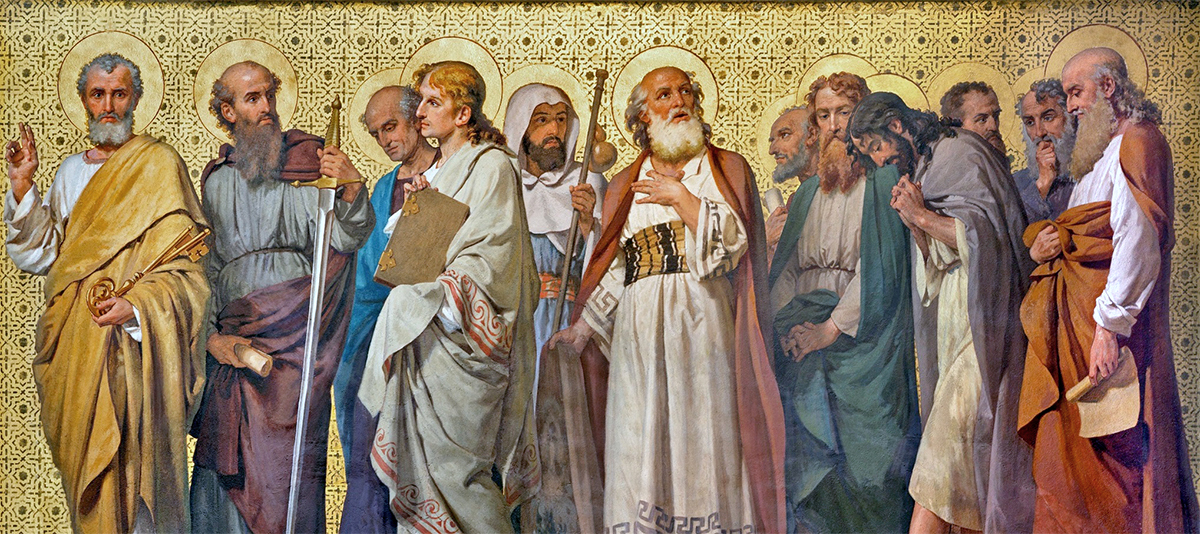
22 May May 2023 Reflection – Michael McFarland SJ
In this period from Easter to Pentecost, the readings at Mass have primarily been about the initial formation of the Christian Church. The sequence of first readings from the Acts of the Apostles chronicles the adventures of Peter, Paul and the other Apostles criss-crossing the known world and founding Christian communities wherever they go. Even the Gospels focus on Jesus gathering his disciples, teaching them, building their trust and giving them the Eucharist, the Bread of Life. This focus is a bit surprising. One might expect more of an emphasis on the Risen Christ, his triumph over death and the transforming power of the new life he brings. But those references are largely absent from the daily Mass readings after the first week. The message is that the Church is the ongoing presence of the Risen Christ in the world and the channel by which the saving power of his death and resurrection is made available to all of us.
From these accounts, we learn several important lessons about the Apostolic Church. The first is that it was about people. The Apostles did not worry about buildings, laws, doctrines and other structures. Their mission was to bring the essential message of Jesus’s death and resurrection to people wherever they were, to touch their minds and hearts and bring them together into a vibrant and loving community. As St. Peter wrote in his First Letter, the Church is made up of “living stones,” in contrast to Judaism, which seemed to be defined by the Temple and the Law.
Second, the Church was expansive in its goals and activities. It kept reaching out to an ever-widening circle of places and people. At first the disciples just preached to the Jews of Jerusalem and Galilee, which was the scope of Jesus’s mission. But once they were driven out of Jerusalem by persecution they went to Samaria, Egypt, Syria and other parts of the Jewish diaspora. Then, when Peter found to his great surprise and consternation that the Gentiles too were receiving the Word and Paul found an enthusiastic reception among Gentiles in every part of the Empire, they realized that God’s call and therefore their mission was universal, meant for the whole world regardless of religious, ethnic, national and racial origins. All of the familiar boundaries that defined their world had dissolved, opening up vast possibilities and also uncomfortable challenges.
That led to the first great crisis that threatened to divide the Church over how these non-Jewish newcomers were to be treated. It came to a head with the demand of some of the original Jewish Christians that the Gentile converts first convert to Judaism before being accepted into the Church. That was what forced the leaders to think seriously about authority and structure. They realized that these were needed to hold the community together and give it coherence and direction. Yet, while there was apparently a leadership structure, with James at the top initially, they were still aware that the ultimate authority was with God. Therefore they entered into what we would now call a process of communal discernment. Through prayer, consultation of the Scriptures, consideration of their concrete experience, and reasoned debate, they ultimately reached a consensus resolution, which removed almost all restrictions on membership while setting a basic moral code for everyone. This was done in the name of the Holy Spirit but conveyed through the Apostolic leadership.
This spirit continues to define the ideal of the Church today, even as it has become vastly larger and more complex, encompassing a billion people in every part of the world. It is above all about people, drawn together in a loving and caring community by their response to God’s call. They are sinners redeemed by God’s mercy. They are the faithful devoted to God’s service through their love of Christ. They are the lost and rejected who have found a home. They are the weak and struggling who seek healing. Secondly, it is truly universal, encompassing every corner of the world, with people from all backgrounds, representing every race, culture and region. In addition, it is always reaching out, seeking dialogue with different religions, cultures and points of view, bringing the Gospel message to all. We see this in the Gregorian University and its related institutes in Rome. Anyone who visits there is deeply moved by the rich diversity of its students and faculty from 150 countries, representing the whole of humanity, yet all united in their dedication to serving Christ in the Church and preparing for leadership in their respective communities. Finally, while the Church has developed structures of authority needed to provide unity and coherence to such a large and complex body, nevertheless it must always remain open to the movements of the Spirit and the demands of its times, even as it maintains its fidelity to Scripture and tradition. Getting the balance right is never an easy task; but it is one that Pope Francis has taken on with renewed vigor in his promotion of the synodal process throughout the Church, from the local community on up. The Gregorian and its graduates have been deeply invested in this process, providing leadership, expertise, research and reflection while preparing its students for leadership in this renewed Church.
This is our Church, at the same time both Apostolic and contemporary, and we are honored to support it through our work with the Gregorian University Foundation.
Michael C McFarland, SJ
President, Gregorian University Foundation



